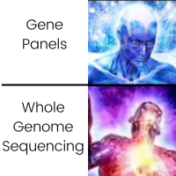Our customers often ask if they can include quality control metrics in their final reports. While which metrics you actually need to report may be unique to your lab, there are a variety of metrics that we can immediately render into a report, and even more that can be rendered with a few customizations. For help with any report modifications,… Read more »
There are many ways to optimize an individual workflow, from increasing the granularity of a filter chain to automating certain multi-stepped tasks. Although the best way to optimize an individual workflow is to book a session with our FAS team to talk about your unique use case, we wanted to highlight five ways a workflow can be optimized across most… Read more »
We at Golden Helix are thrilled with our recent release of gnomAD v4! The curation of this massive database was a huge undertaking for our development team, but with the addition of new features, we believe it was well worth the wait. This annotation track contains allele frequencies from a more diverse population than ever before, with the addition of… Read more »
Many thanks to those who came to view our most recent webcast, From Panels to Genomes with VarSeq: The Complete Tertiary Platform for Short and Long-Read NGS Data. This was a great opportunity for us to showcase the breadth of our workflows, from short-read to long-read, panels to genomes, singleton analysis to families. In this blog, we would like to… Read more »
How long did it take to run coverage regions? Did my colleague update the filter chain like he said he would? Which import options did I use? Where did I save this project? These questions and more can be answered with our little-used VarSeq Log tab. Periodically, our customers come to us with questions in the realm of record keeping,… Read more »
Thank you to all our viewers who attended our webcast last week on VarSeq 2.5.0: VSClinical AMP Workflow from the User Perspective. If you did not get a chance to attend but would still like to see the new upgrades to VarSeq 2.5.0, please visit our website here. Overall, this webcast highlighted the versatility of VarSeq, demonstrating both a Tumor-Normal… Read more »
The table is set, the football game is on in the background, and the family has gathered around the table when out of nowhere, your Cousin Eddie shows up for Thanksgiving dinner. While Cousin Eddie is known for eating anything, his allergies always get the best of him, ruining the evening. Thankfully, this year Cousin Eddie had recently gotten his… Read more »
It may come as a surprise to our long-standing users that the multi-allelic import and representation in VarSeq is slated to have different import options with the 2.5.0 upgrade. As the software grows and evolves, we strive to meet the changing needs of our users, and this is one area where an update was sorely needed. Before going into an… Read more »
Recently, a Golden Helix customer reached out to support for advice on how to validate the variant scoring between two different VarSeq users. Here we break down one possible solution as an opportunity to showcase the utility of both the Latest Sample Assessment function and an alternative way to leverage the Compute Fields function. To set up this validation project,… Read more »
Your variants of interest have been identified, the SVs annotated, and the CNVs classified. Once the manifest has been imported (and here is a great blog on the subject), the last step is to bring all of this information into a report template! In this blog, we will go over some simple report modifications and provide resources for more information… Read more »
The ability to import patient-level information into VarSeq and VSClinical can not only save time while evaluating a sample but can be a critical step in automating project creation through VSPipeline. Here we will review how to construct a basic text manifest and how to apply that manifest to a project. Those fields can then be rendered into the final… Read more »
Discover how to enhance collaboration in VSClinical by sharing variant scores and assessment catalogs through the strategic relocation of the AppData folder. A subtle but powerful utility of VSClinical concerns the ability to share variant scores between users on the same account. What I mean by that is, leveraging the location of the AppData folder, so that users are writing… Read more »
In recent weeks, GenomeBrowse capabilities have had a sudden resurgence of interest among our customers. To support this, the FAS team wanted to share with you several under-utilized GenomeBrowse plotting tricks. First, let’s cover plotting a BED file for easy track viewing. The first step is launching a GenomeBrowse window by clicking the + button and selecting GenomeBrowse (Figure 1)… Read more »
Explore the evolving landscape of genomic analysis, transitioning from targeted gene panels to whole genome sequencing. A recent trend with our customers has been to expand their workflows from small panel sequencing analyses to larger whole exome and genome sequencing analyses. The decreasing cost of sequencing has made this a rather common request. Although more data allows for a greater… Read more »
Discover powerful WES prenatal workflow examples showcasing the detection of Duchenne Muscular Dystrophy, Gaucher Disease, and Fabry Disease through advanced genetic screening techniques. Our recent Prenatal Genetic Screening with VarSeq webcast focused on using whole exome sequencing for prenatal genetic analysis. This webcast was a hit with our customers, who asked for more information on different filtering chains to identify… Read more »
Explore the cutting-edge capabilities of VarSeq in prenatal genetic screening as we delve into real-life cases, expert analysis, and efficient strategies to quickly assess Whole Exome Sequencing (WES) samples for genetic abnormalities in our recent webinar. Thank you all to those who attended our VarSeq webinar covering prenatal genetic screening! We had a great turnout and loved hearing from our… Read more »
A Step-by-Step Guide to Creating a BED File from RefSeq for Accurate Data Analysis Our FAS team has received a flurry of inquiries recently, asking how to run coverage statistics on their projects without a pre-defined BED file. We’re here to help! To analyze sample coverage statistics, you’ll need a BAM or CRAM file that displays the read depth coverage… Read more »
Our FAS team would like to thank everyone who attended our December 2022 webcast, A User’s Perspective: Somatic Variant Analysis in VarSeq 2.3.0. This webcast allowed three members of our FAS team to give their unique insights concerning the improvements to our new VarSeq 2.3.0 release, which will be recapped here. Starting with template creation, our Technical Field Application Scientist,… Read more »
Here at Golden Helix, we would like to take a moment and highlight some of our amazing and talented women in STEM! Below are short excerpts from some of our own Golden Helix employees and their experiences both in STEM and here at Golden Helix. Rana Smalling Field Application Scientist B.A. in Biological Sciences, Ph.D. in Biochemistry My experience in STEM started in… Read more »
There are many reasons a user may wish to focus in on specific variants as part of variant annotation and filtration workflow. You may be looking for the occurrence of specific SNPs in a cohort or perhaps looking for variants known to be associated with specific forms of cancer. For both of these use cases, VarSeq provides a Match String… Read more »















